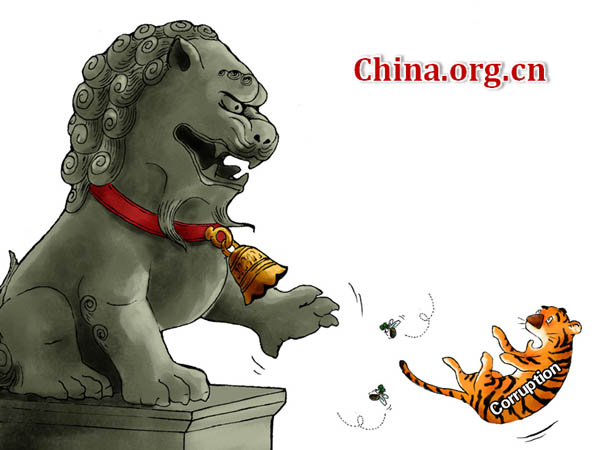Anti-graft drive accelerates into higher gear
 0 Comment(s)
0 Comment(s) Print
Print E-mail Xinhua, December 12, 2014
E-mail Xinhua, December 12, 2014
|
|
|
Shock 'tigers' and awe 'flies' [By Zhai Haijun/China.org.cn] |
The handing of Zhou Yongkang, once one of the most powerful officials in China, over to prosecutors last Friday marked the climax of this year's anti-corruption drive.
Zhou, one of nine Standing Committee members of the Political Bureau of the Communist Party of China (CPC) Central Committee from 2007 to 2012, is the latest and highest-ranking official taken down in the country's anti-corruption campaign that began in November 2012.
"Nailing a high-ranking official like Zhou sends a strong message to all senior officials. It supports the Party's zero-tolerance policy against corruption," said Huang Weiting, a researcher with Seeking Truth, the official magazine of the CPC Central Committee, who has followed the anti-corruption issue.
However, China's anti-graft campaign has moved beyond setting warning examples to deter others. The scale of the investigations, as well as new initiatives and legal reform, indicate that the country intends to fight a protracted war.
The CPC leadership has realized it faces an unprecedented situation and serious challenges in leading a party of 86 million members and ruling a country of 1.3 billion people for the long term.
"Although the majority of CPC members are dutiful and well behaved, corruption has been a prevailing problem and will be a serious threat to the Party's rule of the country if not well contained," Huang said.
The CPC leadership is fully aware that its ability to discipline its own members, especially those with power, will affect its capacity and stability to rule, he said.
President Xi Jinping told media when he was elected general secretary of the CPC Central Committee in late 2012 that to address these problems the CPC must "first of all conduct ourselves honorably." At a CPC disciplinary watchdog meeting in early 2013, Xi also vowed to make no exceptions when it comes to Party discipline and law and to give no leniency, no matter who is involved.







Go to Forum >>0 Comment(s)